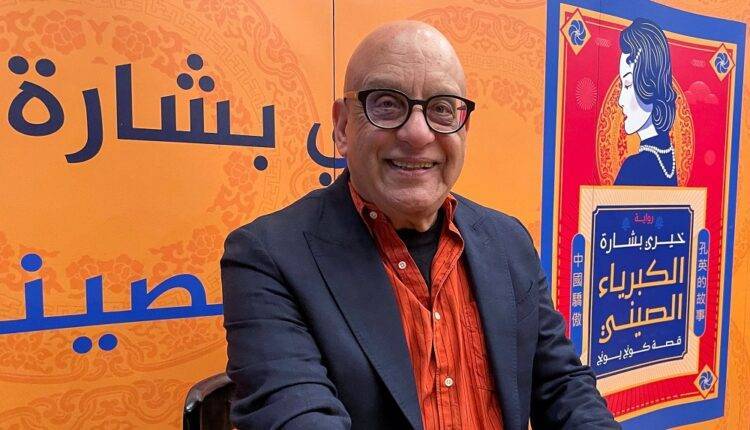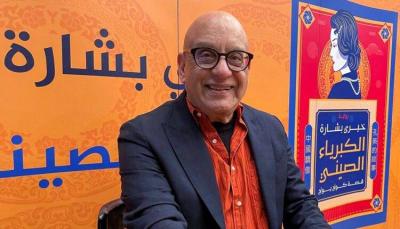Egyptian filmmaker Khairy Beshara has presented a captivating array of films over the past half-century, and at the age of seventy-six, he decided to venture into literature with his debut novel, "Chinese Pride." The novel’s idea is inspired by the life of a man who came from China, the "land of legends," to realize his identity in Egypt, the "land of dreams." Published by Dar Al-Shorouk, the novel spans 517 pages and tells the story of a young man named Kung Yong, who leaves his remote village and impoverished family to travel by bicycle to Shanghai in search of a better life. Fate leads him to leave China in 1937 without identification or money aboard a ship whose destination he does not know.
The young Chinese man arrives in Egypt, a country he has never heard of before, carrying a letter for an unknown woman he met by chance at the Shanghai port, addressed to her husband, who went missing years ago. In his quest to find the letter's recipient, he is arrested and deported to Cairo, where new avenues of life unfold before him. After obtaining identification papers with the help of the Chinese embassy in Cairo, Kung Yong navigates life in a country where he does not speak the language and has no shelter or support. He works various jobs until he finds a stable position with a Polish Jewish antiques dealer, from whom he learns the secrets of the trade and begins to follow the same path.
Throughout his journey from China to Egypt, women play a significant role as inspirations in Kung Yong's life, starting with his pregnant wife, whose fate he does not know, followed by the journalist Roshi, who accompanies him on the ship, then Janowski, the daughter of the antiques dealer, and finally Rosana, an Egyptian of Lebanese descent, whom he converts to Christianity to marry.
Kung Yong calls his older brother Kong Yan from China, and they share a cinema in the Shubra district. Their business ventures expand, leading them to open a Chinese restaurant named Qingdao in downtown Cairo. However, the older brother proves troublesome and ultimately meets a tragic end.
Although Kung Yong is a completely peaceful person and stays away from politics, the significant political events in Egypt intersect with his life against his will, as he becomes close to the pasha class during the monarchy due to his work in the antiques trade. Later, his unique position within the Chinese community leads him into difficult situations. Kung Yong has one son with his wife Rosana, who has twins from a previous marriage. However, their son Adam, born in 1956, faces struggles throughout his life due to his dual identity, experiencing bullying in school and an assault while in university during the 1970s, a period marked by the rise of extremist thought before the assassination of Egyptian President Anwar Sadat.
The novel's events conclude in 1994, when Kung Yong turns seventy-seven, as his circumstances dramatically change. Exhausted from his quest for self-discovery and disconnected from his surroundings, he wanders out of the house one day in his pajamas and slippers, beginning a search for him in the streets of Cairo.
At its core, the novel is an introspective journey of a man from East Asia who achieves his ambition of establishing his personal empire in Egypt, filled with precise political and social details of the world over six decades. The author connects Kung Yong's escape from poverty and ignorance in his remote village to the transformation China underwent during the same period until it became a global power. Moreover, it offers a rare perspective on modern Egyptian history through the eyes of a Chinese immigrant who witnessed the 1952 Revolution, the Tripartite Aggression in 1956, the 1973 War, the 1992 earthquake, and the relationship between successive political regimes and China.
The research effort in the work is evident and impressive, given that the author has never visited China but describes its buildings, streets, and people in detail. He also takes care to document Egyptian and global cinema within the narrative, linking events and film release timings, and even includes a brief overview of each character and setting, akin to a prologue before the conclusion.
In a discussion about the novel at Zawya Cinema in downtown Cairo this week, Khairy Beshara noted that venturing into literary writing is not strange, as the relationship between cinema and literature is close and reciprocal. He mentioned that he was inspired to create this work from the story of a colleague's father at the Film Institute, who left art to focus on business. He also shared that he heard from his friend Hani Yan about the painful experience of his father's disappearance in the mid-nineties, which he transformed into the foundation for the novel.
Khairy stated, "In the novel, I wrote about Kung Yong and Chinese pride, but in reality, it reflects my personal worries, obsessions, and pains; much of it deeply resonates with me, even though I am not telling my own story. It is a portrait of the self but not an autobiography." He also mentioned that he writes free verse poetry and had previously written a novel with only the first and last chapters before pausing but currently intends to return to complete it.




